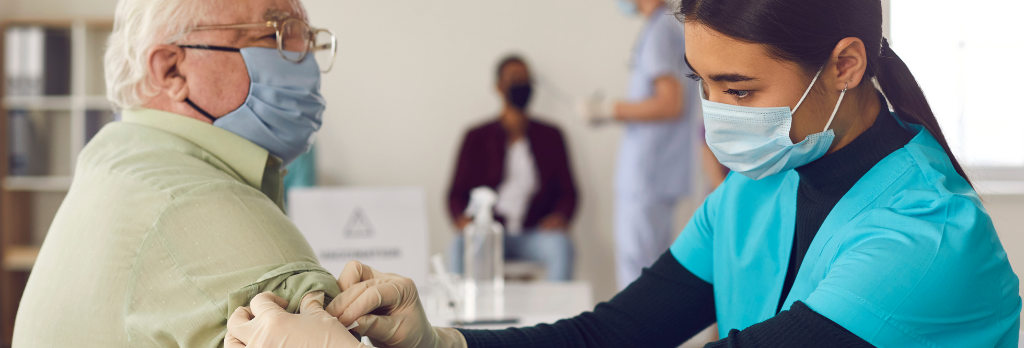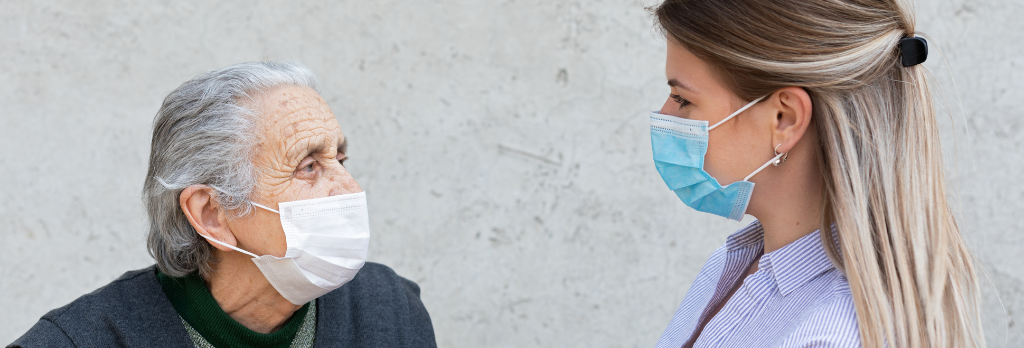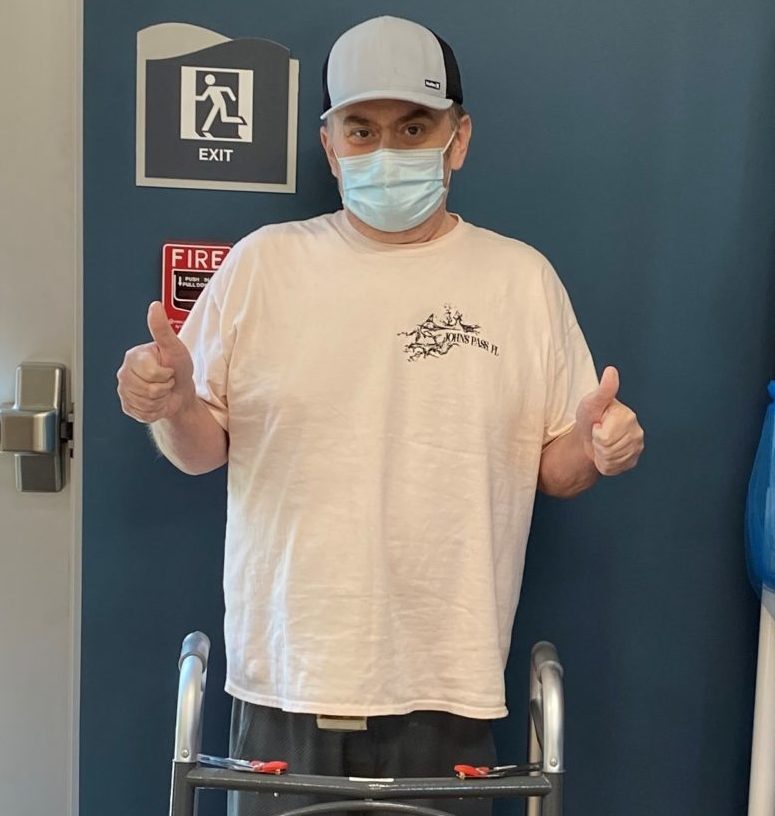What You Need To Know
COVID-19 Vaccine booster shots are available for the following Pfizer-BioNTech vaccine recipients who completed their initial series at least 6 months ago are:
- 65 years and older
- Age 18+ who live in long-term care settings
- Age 18+ who have underlying medical conditions
- Age 18+ who work in high-risk settings
- Age 18+ who live in high-risk settings
Data Supporting Need For A Booster Shot
Studies show that after getting vaccinated against COVID-19, protection against the virus may decrease over time and be less able to protect against the Delta variant. Although COVID-19 vaccination for adults aged 65 years and older remains effective in preventing severe disease, recent data suggests vaccination is less effective at preventing infection or milder illness with symptoms. Emerging evidence also shows that among healthcare and other frontline workers, vaccine effectiveness against COVID-19 infection is decreasing over time. This lower effectiveness is likely due to the combination of decreasing protection as time passes since getting vaccinated (e.g., waning immunity) as well as the greater infectiousness of the Delta variant.
Data from a small clinical trial shows that a Pfizer-BioNTech booster shot increased the immune response in trial participants who finished their primary series 6 months earlier. With an increased immune response, people should have improved protection against COVID-19, including the Delta variant.
Booster Shots Are Only Available For Some Pfizer-BioNTech Vaccine Recipients
Only certain populations initially vaccinated with the Pfizer-BioNTech vaccine can get a booster shot at this time.
Older Adults & 50-64 Year Old People With Medical Conditions
People aged 65 years and older and adults 50-64 with underlying medical conditions should get a booster shot of Pfizer-BioNTech vaccine. The risk of severe illness from COVID-19 increases with age, and can also increase for adults of any age with underlying medical conditions.
Long-Term Care Setting Residents Aged 18 Years & Older
Residents aged 18 years and older of long-term care settings should get a booster shot of Pfizer-BioNTech vaccine. Because residents in long-term care settings live closely together in group settings and are often older adults with underlying medical conditions, they are at increased risk of infection and severe illness from COVID-19.
People With Medical Conditions Aged 18-49 Years
People aged 18-49 years with underlying medical conditions may get a booster shot of Pfizer-BioNTech vaccine based on their individual benefits and risks. Adults aged 18-49 years who have underlying medical conditions are at increased risk for severe illness from COVID-19. However, that risk is likely not as high as it would be for adults aged 50 years and older who have underlying medical conditions. People aged 18-49 years who have underlying medical conditions may get a booster shot after considering their individual risks and benefits. This recommendation may change in the future as more data becomes available.
Employees And Residents At Increased Risk For COVID-19 Exposure & Transition
People aged 18-64 years at increased risk for COVID-19 exposure and transmission because of occupational or institutional setting may get a booster shot of Pfizer-BioNTech vaccine based on their individual benefits and risks. Adults aged 18-64 years who work or reside in certain settings (e.g., healthcare, schools, correctional facilities, homeless shelters) may be at increased risk of being exposed to COVID-19, which could be spreading where they work or reside. Since that risk can vary across settings and based on how much COVID-19 is spreading in a community, people aged 18-64 years who are at increased risk for COVID-19 exposure and transmission because of occupational or institutional setting may get a booster shot after considering their individual risks and benefits. This recommendation may change in the future as more data becomes available.
- Example of workers who may get the Pfizer-BioNTech booster shots
- First responders (e.g., healthcare workers, firefighters, police, congregate care staff)
- Education staff (e.g., teachers, support staff, daycare workers)
- Food and agriculture workers
- Manufacturing workers
- Corrections workers
- US Postal Service workers
- Public transit workers
- Grocery store workers
Find A COVID-19 Vaccine
Find a COVID-19 Vaccine: Search vaccines.gov, text your ZIP code to 438829, or call 1-800-232-0233 to find locations near you.
- Check your local pharmacy’s website to see if vaccination walk-ins or appointments are available
- Contact your state or local health department for more information
Frequently Asked Questions
- When can I get a COVID-19 vaccine booster if I am NOT in one of the recommended groups?
- Additional populations may be recommended to receive a booster shot as more data becomes available. The COVID-19 vaccines approved and authorized in the United States continue to be effective at reducing risk of severe disease, hospitalization, and death. Experts are looking at all available data to understand how well the vaccines are working for different populations. This includes looking at how new variants, like Delta, affect vaccine effectiveness.
- What should people do who received Moderna or Johnson & Johnson’s Janssen vaccine do?
- The Advisory Committee on Immunization Practices (ACIP) & CDC’s recommendations are bound by what the US Food and Drug Administration’s (FDA) authorization allows. At this time, the Pfizer-BioNTech booster authorization only applies to people whose primary series was Pfizer-BioNTech vaccine. People in the recommended groups who got the Moderna or J&J/Janssen vaccine may need a booster shot. More data on the effectiveness and safety of Moderna and J&J/Janssen booster shots are expected soon. With those data in hand, CDC will keep the public informed with a timely plan for Moderna and J&J/Janssen booster shots.
- If we need a booster shot, does that mean that the vaccines aren’t working?
- No. COVID-19 vaccines are working well to prevent severe illness, hospitalization, and death, event against the widely circulating Delta variant. However, public health experts are starting to see reduced protection, especially among certain populations, against mild and moderate disease.
- What are the risks to getting a booster shot?
- So far, reactions reported after getting the Pfizer-BioNTech booster shot were similar to that of the 2-shot primary series. Fatigue and pain at the injection site were the most commonly reported side effects, and overall, most side effects were mild to moderate. However, as with the 2-shot primary series, serious side effects are rare, but may occur.
- Am I still considered “fully vaccinated” if I don’t get a booster shot?
- Yes. Everyone is still considered fully vaccinated two weeks after their second dose in a 2-shot series, such as the Pfizer-BioNTech or Moderna vaccines, or two weeks after a single-dose vaccine, such as the J&J/Janssen vaccine.
- What is the difference between a booster shot and an additional dose?
- A booster shot is administered when a person has completed their vaccine series and protection against the virus has decreased over time. Additional doses are administered to people with moderately to severely compromised immune systems. This additional dose of an mRNA-COVID-19 vaccine is intended to improve immunocompromised people’s response to their initial vaccine series.
- Your CDC COVID-19 Vaccination Record Card & Booster Shots
- At your first vaccination appointment, you should have received a CDC COVID-19 Vaccination Record card that tells you what COVID-19 vaccine you received, the date you received, and where you received it. Bring this vaccination card to your booster shot vaccination appointment. If you did not receive a CDC COVID-19 Vaccination Record card at your first appointment, contact the vaccination sit where you got your first shot or your state health departments to find out how you can get a card.
To learn more, visit https://www.cdc.gov/coronavirus/2019-ncov/vaccines/booster-shot.html#long-term-care





